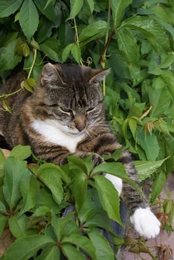Toxic Plants

This is a list of COMMON toxic plants. It is NOT a list of ALL poisonous plants!
Poisoning: General Information
A poison is any substance harmful to the body. Animal baits are palatable (good-tasting) poisons that encourage animals to eat them. This makes them an obvious choice for intentional poisoning.
Cats by nature are curious and have a tendency to hunt small game or explore out-of-the-way places such as wood piles, weed thickets, and storage ports. These environments put them into contact with insects, dead animals and toxic plants. It also means that in many cases of suspected poisoning the actual agent will be unknown. The great variety of potentially poisonous plants and shrubs makes identification difficult or impossible unless the owner has direct knowledge that the cat has eaten a certain plant or product. Most cases suspected of being malicious, deliberate poisoning actually are not.
In some types of vegetation only certain parts of the plant are toxic. In others, all parts are poisonous. Eating them can cause a wide range of symptoms, including: MOUTH IRRITATION; DROOLING; VOMITING; DIARRHEA; HALLUCINATIONS; SEIZURES; COMA; AND DEATH. Other may cause skin rash.
Poisonous Houseplants
A. HOUSEPLANTS that may cause a rash after contact with the skin or mouth:
- Chrysanthemum
- Creeping Fig
- Weeping Fig
- Poinsettia
B. IRRITATING PLANTS, some of which contain oxalic acid that causes mouth
swelling, and occasionally may cause generalized toxicity such as staggering
and collapse:
- Arrowhead Vine
- Arum Lily
- Boston Ivy
- Caladium
- Calla Lilly
- Devil’s Lily
- Dumbcane
- Elephant’s Ear
- Emerald Duke
- Heart Leaf Philodendron
- Jack-in-the-Pulpit
- Majesty
- Malanga
- Marble Queen
- Mother-in-Law Plant
- Nethithyis
- Parlor Ivy
- Pothos
- Peace Lily
- Philodendron
- Red Princess
- Saddle Leaf Philodendron
- Split Leaf Philodendron
- Snake Plant
C. TOXIC PLANTS which may contain a wide variety of poisons. Most cause
vomiting, abdominal pain, and/or cramps. Some cause tremors, heart and
respiratory or kidney problems, which may be hard for an owner to identify:
- Amaryllis
- Asparagus Fern
- Azalea
- Bird of Paradise
- Creeping Charlie
- Crown of Thorns
- Elephant Ears
- Glocal Ivy
- Heart Ivy
- Ivy
- Jerusalem Cherry
- Needlepoint Ivy
- Pot Mum
- Ripple Ivy
- Spider Mum
- Sprangeri Fern
- Umbrella Plant
Outdoor Plants with Toxic Effect
A. OUTDOOR PLANTS that cause vomiting and diarrhea in some cases:
- Bittersweet Woody
- Castor Bean
- Delphinium
- Daffodil
- Foxglove
- Ground Cherry
- Indian Tobacco
- Indian Turnip
- Larkspur
- Poke Weed
- Skunk Cabbage
- Soap Berry
- Wisteria
B. TREES, SHRUBS, AND OUTDOOR PLANTS that are poisonous and may cause varied toxic effects:
- American Yew
- Angel’s Trumpet
- Almond
- Apricot
- Azalea
- Balsam Pear
- Bird of Paradise Bush
- Black Locust
- Buckeye
- Buttercup
- China Berry
- Coriaria
- Dologeton
- Dutchman’s Breeches
- English Holly
- English Yew
- Horse Chestnut
- Mock Orange
- Japanese Plum
- Jasmine
- Loco Weed
- Lupine
- Matrimony Vine
- May Apple
- Monkey Pod
- Moonseed
- Moonweed
- Morning Glory
- Mushrooms
- Nightshade
- Nutmeg
- Nux Vomica
- Peach Cherry
- Periwinkle
- Pig Weed
- Poison Hemlock
- Privet Hedge
- Rain Tree
- Rhododendron
- Rhubarb
- Spinach
- Water Hemlock
- Western Yew
- Wild Cherry
For more information on which plants are poisonous, visit Cornell’s Poisonous Plants List at http://www.ansci.cornell.edu/plants/index.html.
Treating for Contact with Toxins or Poisons
If you think your cat may have been poisoned, contact your veterinarian immediately. Minutes can mean the difference between life and death. Then try to identify the poison. Most products containing chemicals are labeled for identification. Read the label. If this does not give you a clue to the item’s possible toxicity, call the emergency room of your local
hospital and ask for information from the Poison Control Center.
Alternatively, call the ASPCA Poison Control Hotline at 1-888-426-4435 or visit their website at www.aspca.org/. This hotline is open 24 hours a day, seven days a week.















